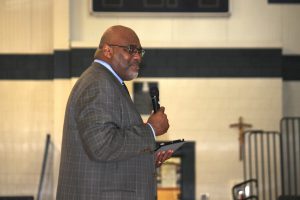Veritas Lecture Series
Mr. Stephen Davis | The (Opportunity) Cost of Leadership
Posted October 27th, 2016
By Aiden Baltz ’17
Few people are able to say that they are champions. Even fewer are able to say that they are national champions. Mr. Stephen Davis is the Associate Dean of Students at Stockton College. He was recently honored by Stockton’s Council of Black Faculty and Staff, is in the Gloucester County Sports Hall of Fame, and was a member of Joe Paterno’s 1986 national champion Nittany Lion team.
Mr. Davis is one of the few.
Many people would call Mr. Davis a leader because of his title as a champion. But he argues that you do not need to be a champion to be a leader. Nor is a leader just the dictionary.com definition of “a person who guides a group.” Leaders are not always the ones we read about on Twitter. Leaders do not always need to be in control.
Instead, Mr. Davis believes a leader is someone who is willing to accept that life is an accumulation of opportunity costs.
Opportunity costs are simple: they are what you sacrifice when you decide to take one course of action over another. For example, a collegiate student-athlete is losing an opportunity to do many things. He might not be able to study abroad or go out on a Thursday night. He won’t be able to stop running whenever he feels tired. He will probably feel like his freedom is restricted on a daily basis. But a leader–a true leader–recognizes that he has to make these sacrifices in pursuit of a higher purpose.
Mr. Davis made it a point to speak of his friend, David Clark. He was a highly sought after recruit in high school who attracted at least 75 scholarship offers. When he got to Penn State, however, he was always behind another running back on the depth chart. David sat for five years. He contemplated quitting the game.
But after a long five years of not playing David finally got his big break. It was against the University of Cincinnati, and Penn State was the favored team. When they were losing and the starting running back got hurt it was David’s turn to lead the team. Looking defeat in the face, David entered into the belly of the beast. He ran the ball through five players and scored the winning touchdown.
David sat for five years. To say he was not a leader during those five years simply because he didn’t see the field would be missing the point. He did not give up when things weren’t going his way. He worked to hone his craft over five years in order to be the hero for five minutes.
Mr. Davis used a metaphor that I really took to heart. He said, “Once our blazers are on, they never really come off.” It took me a little while before the power of that hit me in the context of our lives here at the Prep. Once we put on the blazer and joined the ranks of our other brothers at this school, we became leaders. Our actions need to model who we want to be. This means that our actions have an immensely powerful impact on our community.
Modeling leadership is a full-time job. Failure can arise anywhere. Whether you fail a test or miss the game-winning shot, what really matters is how you respond. Grasp that next opportunity. Study harder. Get extra help. Put in the extra reps. One more, two more. The opportunity is there for you to seize.
Being a leader is not easy, or everyone would do it. A leader is not always the one who gets the fanfare, not always the most loved or best player on the team, and not always a champion. Therefore, each of us has the potential to be a leader. It is just up to us to want it badly enough.





